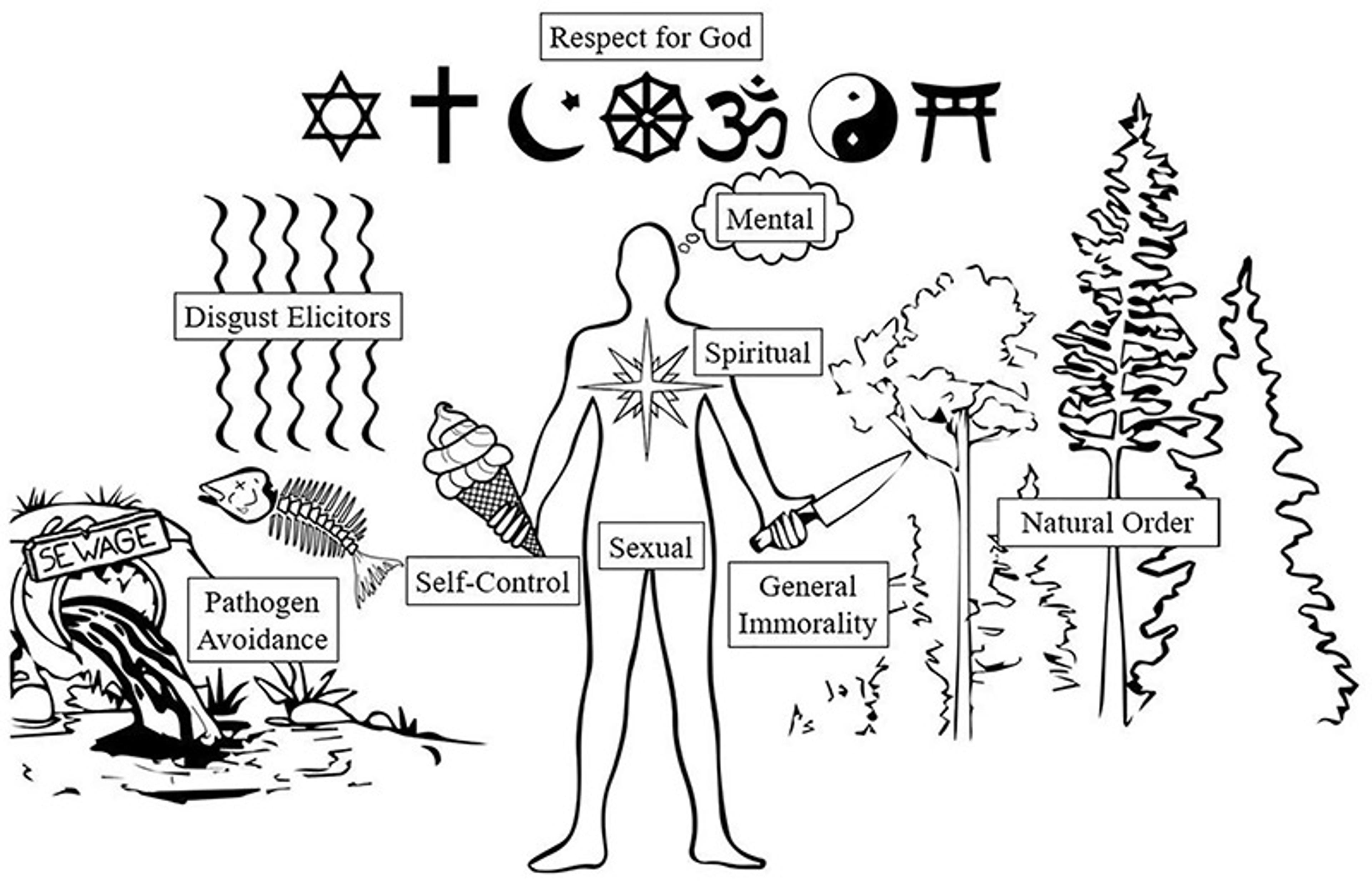For about 20 years, researchers working in the field of moral psychology have been asking individuals whether it is morally wrong to have sex with a dead chicken. A reasonable person may wonder why; it might seem like moral psychologists are spending too much time in the barnyard erotica section of the local bookstore. But what they are really interested in is what moral judgments of this odd behaviour (along with others) can represent – the idea of ‘purity’.
Psychologists define purity in a lot of ways. In fact, one of the problems of purity is just how many ways it is understood. But it is commonly used to refer to moral intuitions about acts that are perceived to desecrate the body, mind, spirit or nature, and thereby violate the purity of someone or something. One of the most common ways of measuring people’s perceptions of purity is by assessing their reactions to weird scenarios.
While most people are not exactly ‘C’est la vie’ about dead-chicken sex, political conservatives are especially likely to condemn this behaviour as not only weird and deviant, but also immoral. Liberals – by which we mean people who lean Left, politically – seem to have a slightly different reaction. While the idea may make them squirm, they are more likely to make a conclusion along the lines of: ‘It’s not something I would do, but it’s not really harming anyone (the chicken is already dead), so it’s not necessarily immoral.’
What does this have to do with differences in moral psychology? Well, moral psychologists have suggested that politically charged arguments about sexuality, spirituality and other subjects reflect deep differences in the moral values of liberals and conservatives. Research involving scenarios like this one has seemed to indicate that conservatives, unlike liberals, think that maintaining ‘purity’ is a moral good in itself – which for them might mean supporting what they construe as the ‘sanctity of marriage’, for example.
It may seem strange to think about ‘purity’ as a core driver of political differences. But purity, in the moral sense, is an old concept. It pops up in the Hebrew Bible a lot, in taboos around food, menstruation, and divine encounters. When Moses meets God at the Burning Bush, God says to Moses: ‘Do not come any closer, take off your sandals, for the place where you are standing is holy ground.’ Why does God tell Moses to take off his shoes? Not because his shoes magically hurt God, but because shoes are dirty, and it’s disrespectful to wear your shoes in the presence of the creator of the universe. Similarly, in ancient Greece, worshippers were often required to endure long purification rituals before looking at sacred religious idols or engaging in different spiritual rites. These ancient moral practices seem to reflect an intuition that ‘cleanliness is next to Godliness’.
In the modern era, purity has repeatedly appeared at the centre of political battlegrounds, as in clashes between US conservatives and liberals over sexual education and mores in the 1990s. It was around this time that the psychologist Jonathan Haidt began formulating a theory to help explain the moral divide. Moral foundations theory argues that liberals and conservatives are divided because they rely on distinct moral values, including purity, to different degrees.
It seems to make intuitive sense at first that conservatives care more about purity than liberals do. But is it true? In a review of the concept in the journal Personality and Social Psychology Review in 2022, we made the case that this account of purity might have some serious flaws. We also proposed a new explanation of moral judgments that we believe fits the data better. We argue that purity is not just something that conservatives care about; people on both the Left and the Right care about purity when our minds connect ‘impure’ acts to perceptions of harm.
To assess concerns about purity, researchers have tended to ask about the immorality of behaviours such as sexual promiscuity or masturbation. Of course, conservatives (at least in the US, where much of the research has taken place) are more likely than liberals to rate these things as impure and immoral. But there may be other sorts of ‘impurity’ that liberals might be more likely to condemn. If we discover these acts, it would suggest that purity is not a special conservative thing, but only seems that way because researchers have used a small (and biased) set of acts.
What might people on the Left consider sacred and want to keep ‘pure’? One possible answer is nature. Consider the story of the Italian mountaineer Cesare Maestri, who in 1970 achieved a climbing feat that many thought impossible: summiting the Cerro Torre Mountain in Patagonia. When the details of his methods emerged, however, the climbing community was outraged. His team had used a gas-powered air compressor to drill hundreds of permanent bolts into the mountain’s face. Drilling into rock wasn’t obviously causing anyone harm, but the climbers said it desecrated the mountain. In 2015, psychologists (including Haidt) asked a sample of liberal climbers to share their opinions of the bolts in the mountain. The climbers frequently objected to it in purity-related terms (eg, the act was ‘disgusting’, or the mountain would be ‘desecrated’).
While conservatives seem to care more about apparent violations of purity in the domains of sex and religion, many liberals also appear to care deeply about purity with regard to matters such as respecting sites of cultural significance and preserving spiritual integrity. For example, liberals are likely to use purity-related language (eg, ‘desecrate’, ‘dirty’ or ‘toxic’) when condemning acts that impact the environment, such as building oil pipelines, or when describing the feeling of having racist thoughts.
In our 2022 analysis of the research on purity to date, looking at more than 150 studies, our team identified nine subcategories of concerns that researchers have associated with the concept. The image below neatly captures all of these. The various scientific understandings of purity are broadly split between physical concerns, such as avoiding pathogens and disgust elicitors, psychological concerns, like avoiding ‘dirty’ thoughts, and metaphysical concerns, like maintaining spiritual integrity or respecting God and the ‘natural order’.

Visual representation of different understandings of purity. Artwork by Ella Gaines
The only thing most of these ‘purity’ themes appear to have in common is that they can’t be easily connected to interpersonal harm. In other words, they seem to involve victimless wrongs – at least superficially. But this tells us only what purity is not. Our analysis of all the studies on purity reveals that scientists have inadvertently defined purity as the absence of obvious harm, creating a messy construct.
Fortunately, there may be a simpler way to understand issues related to what’s been called ‘purity’. Moral psychology has done an excellent job of describing the rich and diverse tapestry of human moral values and concerns. But we think that the various pieces of this tapestry, including concerns about purity, may ultimately connect to a single underlying factor: the perception of harm.
Why did climbers criticise Maestri for putting metal hooks in a rock face? Why do people condemn the person in the deceased-chicken scenario? These acts seem, in a conventional sense, harmless. But maybe that construes harm too narrowly. Dead chickens or mountains may not suffer, but perhaps when people learn of these behaviours, they have an intuition that this is going to have some negative consequences. People perceive harm. It may not be as concrete as the harm of kicking a child, but the gut feeling still persists. People may intuit that treating an awesome mountain like your own personal playground will lead to others following suit; eventually, as a consequence, the beauty of the mountain could be ruined for everyone. Or, in the dead-chicken example: aside from the hard-to-shake feeling that there is a risk of disease, perhaps we imagine that someone who has sex with dead chickens may get a hankering for a more lifelike counterpart, or feel encouraged to behave in other transgressive (and harmful) ways. You would be unlikely to choose such a person as a babysitter because you would assume that they are likely to commit more concrete harm to your children. Studies find that people expect those who perpetrate impurity will also perpetrate harm.
One of us (Kurt Gray) and his colleagues ran some psychological studies to test whether perceptions of harm help drive the moral condemnation of so-called ‘harmless wrongs’. The team asked study participants to rate the immorality of ‘impure’ actions (eg, watching videos of animal sex to become aroused). In some cases, participants had time for deliberation; in others, they were forced to answer quickly, with the aim of encouraging them to respond with their gut feelings or intuitions. Then, they were asked to rate how harmful each action was. People generally saw the ‘impure’ actions as harmful – less so than an act such as murder, but still more harmful than something like riding the bus. Importantly, perceptions of harm in the ‘harmless wrongs’ scenarios were found to be higher when people were under time pressure. This suggests that people make a quick, intuitive connection between seemingly impure acts and harm.
In another test, we found that harm ratings predicted immorality ratings much better than ratings of impurity did. In other words, people saw ‘impure’ acts as wrong, but only to the extent that they intuitively saw them as harmful.
A harm-focused perspective on moral judgments related to ‘purity’ could help us better understand and communicate with moral opponents. We all grasp the importance of protecting ourselves and our loved ones from harm. Learning that people on the ‘other side’ of a political divide care about questions of purity because they connect these to their understanding of harm can help us empathise with different moral opinions. It is easy for a liberal to dismiss a conservative’s condemnation of dead-chicken sex when it is merely said to be ‘impure’; it is harder to be dismissive if it’s suggested that someone who makes a habit of that behaviour might end up harming people.
Explicitly grounding discussions of morality in perceptions of harm could help us all to be better citizens of a ‘small-L liberal’ society – one in which the right to swing our fists ends where others’ noses begin. If something seems disgusting, impure and immoral to you, take some time to try to articulate the harms you intuitively perceive. Talking about these potential harms may help other people understand where you are coming from. Of course, someone might not share your judgment that harm is being done. But identifying perceived harms at least puts the conversation in terms that everyone understands.
It’s important to remember that judgments of purity and feelings of disgust are not an infallible moral guide. For a long time, people have used feelings of disgust and the idea of racial ‘purity’ to justify moral judgments of interracial marriage, for example. But people also feel disgusted by the behaviour of someone like Martin Shkreli, the disgraced pharmaceutical investor, whose price hikes created huge profits while putting medication out of reach for many people who needed it. In that latter example, disgust seems like a decent moral guide because most of us agree that denying sick people medication is harmful.
One scholar is known for his steadfast faith in the importance of feeling revolted. Leon Kass argued in 1997 that any future practice of cloning humans should be banned. He defended his position by pointing to the impurity of the practice; his article was titled ‘The Wisdom of Repugnance’. Yet repugnance and disgust, on their own, are not sufficient for moral condemnation. If you want people who don’t feel the same way you do to understand your position on a moral issue, you will need to articulate the potential harms of seemingly immoral acts. Kass wrote: ‘Shallow are the souls that have forgotten how to shudder.’ This is the way many of us regard moral opponents nowadays: seeing them as shallow or morally bereft, and not bothering to connect with them because they seem so different from us. But we have much in common. People of different political orientations care about maintaining purity because they see it as protecting themselves and others from harm. By putting this harm into words, we may find that there is greater potential for understanding than we thought.








